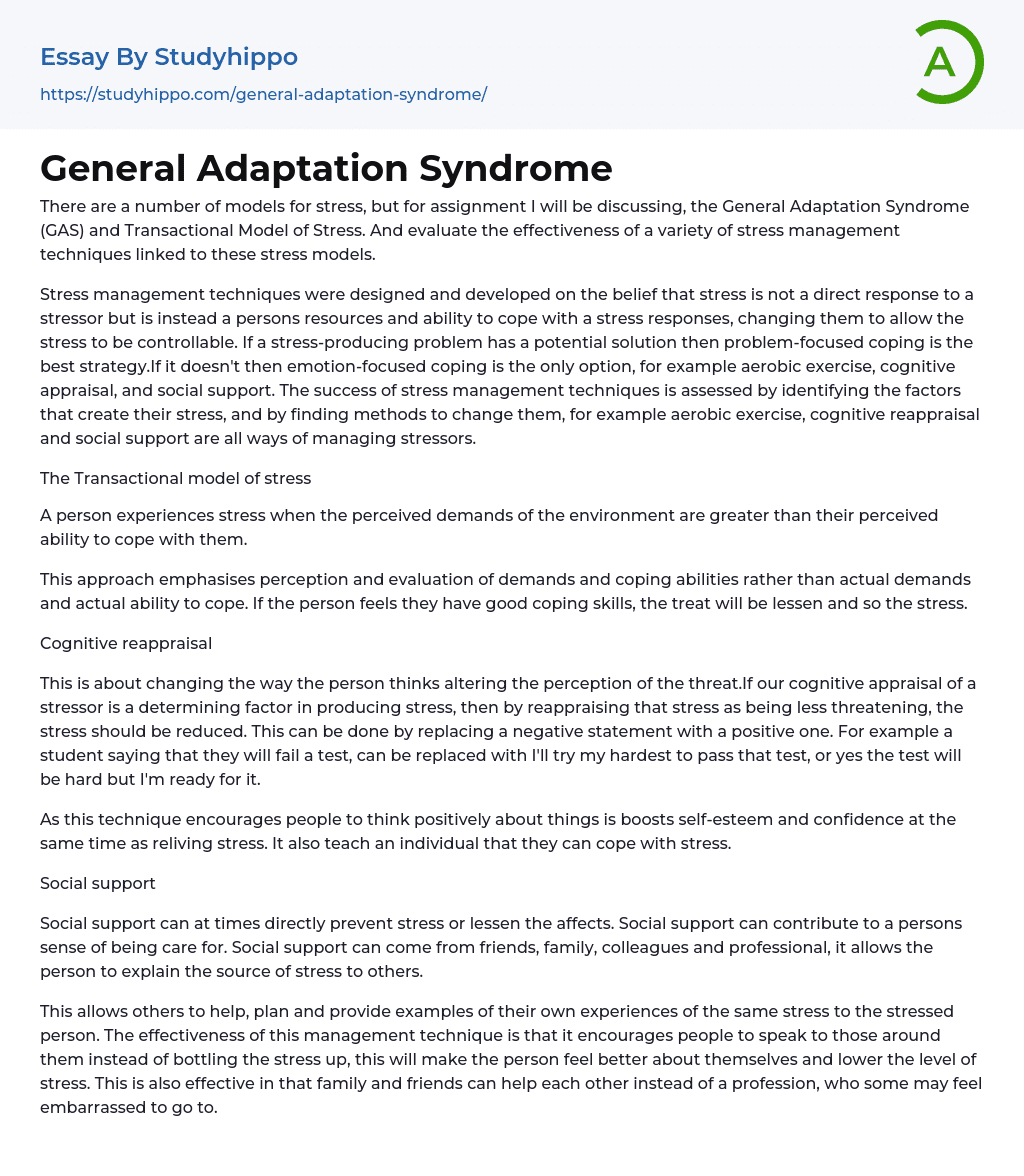There are a number of models for stress, but for assignment I will be discussing, the General Adaptation Syndrome (GAS) and Transactional Model of Stress. And evaluate the effectiveness of a variety of stress management techniques linked to these stress models.
Stress management techniques were designed and developed on the belief that stress is not a direct response to a stressor but is instead a persons resources and ability to cope with a stress responses, changing them to allow the stress to be controllable. If a stress-producing problem has a potential solution then problem-focused coping is the best strategy.If it doesn't then emotion-focused coping is the only option, for example aerobic exercise, cognitive appraisal, and social support. The success of stress management techniques is assessed by identifying the factors that create their stress, and by finding methods to change them, for e
...xample aerobic exercise, cognitive reappraisal and social support are all ways of managing stressors.
The Transactional model of stress
A person experiences stress when the perceived demands of the environment are greater than their perceived ability to cope with them.
This approach emphasises perception and evaluation of demands and coping abilities rather than actual demands and actual ability to cope. If the person feels they have good coping skills, the treat will be lessen and so the stress.
Cognitive reappraisal
This is about changing the way the person thinks altering the perception of the threat.If our cognitive appraisal of a stressor is a determining factor in producing stress, then by reappraising that stress as being less threatening, the stress should be reduced. This can be done by replacing a negative statement with a positive one. For example a student sayin
that they will fail a test, can be replaced with I'll try my hardest to pass that test, or yes the test will be hard but I'm ready for it.
As this technique encourages people to think positively about things is boosts self-esteem and confidence at the same time as reliving stress. It also teach an individual that they can cope with stress.
Social support
Social support can at times directly prevent stress or lessen the affects. Social support can contribute to a persons sense of being care for. Social support can come from friends, family, colleagues and professional, it allows the person to explain the source of stress to others.
This allows others to help, plan and provide examples of their own experiences of the same stress to the stressed person. The effectiveness of this management technique is that it encourages people to speak to those around them instead of bottling the stress up, this will make the person feel better about themselves and lower the level of stress. This is also effective in that family and friends can help each other instead of a profession, who some may feel embarrassed to go to.
The general adaptation syndrome
This model provides the summary of the physiological changes that follow stress as the body tries to cope. Out of the 3 stages, the alarm stage is the one where the stress should be identified so that it is easier to manage.
In this model it is easier to cope with stress the early it is noticed or if the person is ready for the stress or knows a way of coping.
Relaxation
Relaxing is based on the same principle as cognitive reappraisal. One producer
for relaxation is progressive relaxation. This involves 3 steps,
- Recognising your bodies signals that you are experiencing stress
- Using those signals as a cue to start relaxing and,
- Relaxing by focusing attention on different groups of muscles like arms and neck
The effectiveness of this is that you can learn what muscles groups are affected when you get stressed, for example when you have an exam you may tighten the muscles in your hands once the person id aware of this they can begin to relax. It also allows you to stop and think and free the negative thoughts from your head.
This method allows the person to identify stage 1 of GAS so they can identify what stresses them.
Exercise
People who regularly exercise often have lower stress levels. Exercise is a way of following through our bodies message of fight or flight. Exercise helps use up the extra sugar, and adrenalin produced in stage 1 of GAS.The effectiveness of this stress reliving method is often quickly felt, the action of exercise also allows people to have time to think about other things not the stressor and encourages them to develop healthier lifestyles.
Bibliographyhttp:
- //www.nj-act.org/article3.html
- Pressure essays
- Confidence essays
- Disgrace essays
- Lost essays
- Harmony essays
- Fairness essays
- Sarcasm essays
- Respect essays
- Responsibility essays
- Empathy essays
- Suffering essays
- Suspense essays
- Fear essays
- Feeling essays
- Loneliness essays
- Ambition essays
- Tolerance essays
- Hope essays
- Inspiration essays
- Kindness essays
- Shame essays
- Desire essays
- Doubt essays
- Grief essays
- Hate essays
- Laughter essays
- Passion essays
- Pride essays
- Forgiveness essays
- Happiness essays
- Humanity essays
- Loyalty essays
- Guilt essays
- Honesty essays
- Betrayal essays
- Need essays
- Boredom essays
- Courage essays
- Regret essays
- Anger essays
- Honor essays
- Honesty Is The Best Policy essays
- Anatomy and Physiology essays
- Addiction essays
- Biodegradation essays
- Dental Care essays
- Disease essays
- Disorders essays
- Health Care essays
- Intelligence Quotient essays




